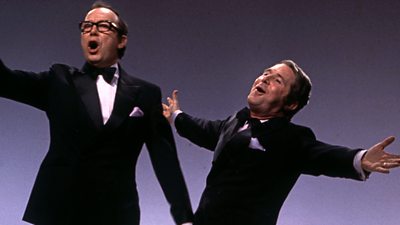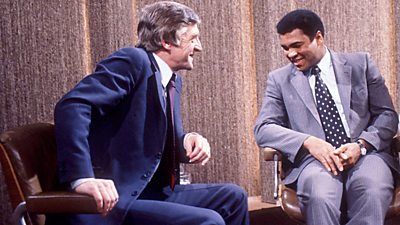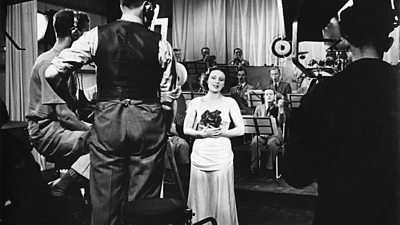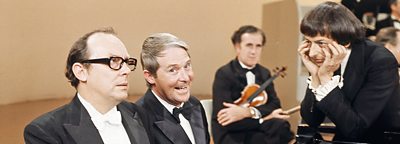Memories of Saturday night viewing – particularly in the 1960s and 1970s – can evoke a keen sense of nostalgia amongst viewers of a certain age. The schedule tended to follow a pattern, one which was carefully constructed and had something for the whole family.
When the sports programme ended, there was an opportunity for all to sit and enjoy Basil Brush or Doctor Who, then after some news, a family entertainment show or Dixon of Dock Green followed by some variety of The Two Ronnies, or Morecambe and Wise kind. The news would then signal a shift in gear (and time to put the children to bed) before programmes for the adults were broadcast – Match of the Day and then Parkinson, with maybe a film to .
The evening was familiar, comforting, and popular. Here’s Paul Fox, responsible for launching a whole host of familiar Saturday night entertainment programmes, on the importance of getting the schedule right:
But it hadn’t always been like this. When ITV first arrived in 1955, the ����ý faced competition for its viewers. The commercial company soon made its mark, especially in the field of entertainment, and aimed to ensure that it would capture the weekend audience with programmes such as The Adventures of Robin Hood, US imported police series, Dragnet, and Sunday Night at the London Palladium.
Steven Hearst joined the ����ý in 1952 and went on to become an executive producer in arts and music. Here he recalls how the Corporation was slow to respond to competition on Saturday nights:
By the late 1960s and early 1970s, the ����ý had established a Saturday evening/night format which was winning audiences back. There was no shortage of talent available to those scheduling Saturday nights on the ����ý. Singers, comedians and impersonators, Variety artists of all kinds, were at the Corporation’s disposal to ensure the largest family audience possible.
At the same time, the ����ý always had one eye on the competition (in the pre-Channel 4 three-channel era), and was looking for new, innovative programme ideas. In an interview in 1988, the doyen of light entertainment and Variety at the ����ý in the 1970s, Bill Cotton, talked of the big celebrities who appeared on ����ý Television, and explained how one of the big hits of the Seventies, The Generation Game, came to be:
The Generation Game
There’s no doubt that The Generation Game anchored the ����ý One schedule in the 1970s and early 1980s. Indeed it was a key piece of armour in the Saturday night battle for viewers between the ����ý and ITV.
It was first hosted first by Bruce Forsyth and then, from 1978 onwards when Forsyth left the Corporation to host a Saturday night programme on ITV, by Larry Grayson. During Grayson’s era, the programme hit its highest ratings of 25m but was eventually axed in 1982, being beaten in the ratings by ITV’s Game For a Laugh.
The Generation Game returned in 1990 with Bruce Forsyth hosting once again. It had supporters among the higher echelons of the ����ý. Marmaduke Hussey, Chairman of the Corporation’s Governors between 1986 and 1996, talked about the programme with Frank Gillard in 1993:
I think The Generation Game is hilarious. I've watched The Generation Game with my wife and my children and myself, all of different attitudes of mind, and we've all thought them very funny. I regard Generation Game as an excellent game of its genre.
Morecambe and Wise

One of the mainstays of the Saturday evening schedule was Variety, and this was personified in a number of comic double acts at the ����ý: The Two Ronnies, Little and Large, and Morecambe and Wise. Morecambe and Wise joined the ����ý in 1968 at a point when Bill Cotton, the ����ý’s Head of Light Entertainment, had been looking to inject some comedy into Saturday night entertainment which has been dominated up until that point mainly by music programmes.
John Ammonds, who also worked on shows with Harry Worth and Val Doonican, was put in charge of producing their show. Here is Ammonds being interviewed for the ����ý Oral History Collection in 2017:
The Morecambe and Wise shows proved to be extremely popular in the Saturday evening slot. A formula which consisted of guest appearances from big stars (who were often ridiculed), running gags (one had to feel sorry for Des O’Connor) and the pure genius of the relationship between Eric and Ernie earned them ratings in excess of 20 million viewers. Ammonds, Morecambe, and Wise, together with writer Eddie Braben, formed what Bill Cotton called 'one of the best teams in television... each superlative in his own line of country as performers, producer and scriptwriter'.
Parkinson

Bill Cotton, had been looking for a chat show format similar to that of chat show host Jack Paar in the United States. He settled on Michael Parkinson, a former current affairs journalist and presenter, and matched him with producer Richard Drewett. In an interview for the British Entertainment History Project, he explained that Paul Fox wasn’t keen on the idea of offering a chat show series to Parkinson:
The late-night slot for Parkinson was key to the success of the show as Cotton explained to Frank Gillard in an interview in 1988:
I then did Parkinson on Saturday nights... done with a great deal of care... I'd worked out that between eleven and twelve at night, if you looked at times when anything was on of any consequence on... any of the networks, there were between five and eight million people sitting there.
As Bill Cotton reflected in his book, Double Bill: 80 years of entertainment, the lateness of the show also allowed for post-watershed material. He cites Jimmy Tarbuck and Billy Connolly as two guests who pushed the boundaries with their jokes.
Michael Parkinson interviewed over 2000 guests, all celebrities in their field. Some of the most memorable include Muhammad Ali, Kenneth Williams and, much to Parkinson’s regret, Rod Hull and Emu.
Conclusion
Saturday night viewing has changed over the years. As the multichannel age dawned, the family habit of gathering altogether around the television set of a Saturday evening began to wane. However, in recent times, with the hugely successful return of Doctor Who and Strictly Come Dancing in the autumn schedule of ����ý One, traditional family viewing on Saturday evening has been given a second lease of life.
-

RadiOlympia – the first ����ý entertainment programme 85 years ago
Our gallery of images reveals what went on behind the scenes at the first entertainment programme on ����ý Television.
Further Reading
- Bill Cotton, Double Bill: 80 Years of Entertainment (2000)
- Joe Moran, Armchair Nation: an intimate history of Britain in front of the TV (2013).

